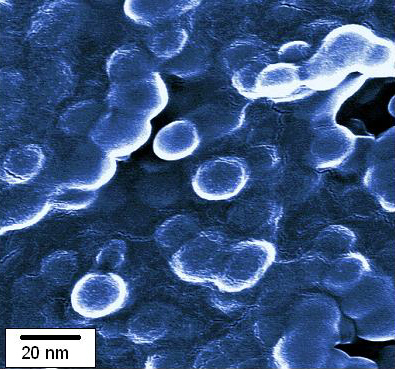Nanoparticles
A novel trend in environmental reaserch is the application of nano-reagents and nano-catalysts. That means nano-technology found its way into environmental technology. Iron(0) nano-particles are already used successfully in the field of groundwater treatment. The Department of Environmental Technology of the UFZ works on the development of nano-particles for several environmental applications: On the one hand, an adsorption system is studied which is based on colloidal activated carbon. Aim of the research is an in-situ treatment concept for contaminated aquifers where a sorption barrier is built by injection into and immobilization of colloidal sorbents directly in the aquifer.
In a second step, sorption/reaction-systems are studied where the colloidal sorbent is equipped with a reactive component (such as Fe(0)). In addition, for special applications in wastewater treatment extremely active palladium catalysts are studied. These catalysts are prepared on the basis of ferromagnetic carrier colloids, which ensure a separation of the catalysts from the treated water by means of strong permanent magnets. The evaluation of possible risks of such nano-sized catalysts for living cells plays an important role within these studies. The investigations are carried out in close co-operation with the Department Celltoxicology of the UFZ. The following main points are part of the research in the field of nano-particles for environmental applications:
Application of activated carbon colloids (AC) for the in-situ construction of sorption barrieres in contaminated aquifers
Preparation and testing of Carbo-Iron - a sorption/reaction-system by adding a reactive component to colloidal AC
Application of nano-sized catalysts for wastewater treatment

